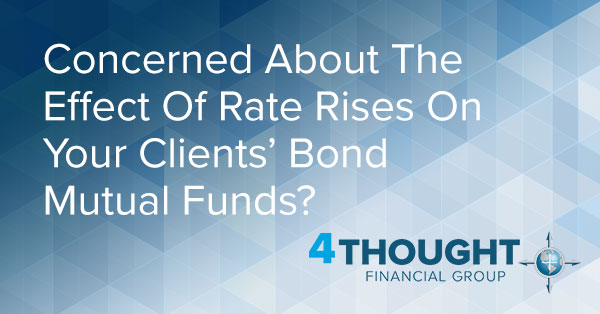4Thought Financial Group's Multi-Contingency Investing Methodology
"Our portfolio modeling process starts with creative proprietary research and empirical data analysis. Our findings are used to generate decision making formulas that are able to rapidly and repeatedly analyze vast quantities of raw data and drive our buy/sell/allocation decisions in tune with the specific investment mandates of each of the separately managed accounts offered."
If when you look at your clients’ investment portfolio statements or 1099’s during tax season you see a series of five-digit ticker symbols (usually indicating an open-end mutual fund), you should stop what you’re doing and make a note to have a follow up conversation with that client. During the last two decades there have been monumental advances in the investment management industry in terms of investment advisory technology and fund expense reduction. If your clients and their financial advisors are still constructing the bulk of a portfolio using traditional open-end actively management mutual funds, then this is an indication that they have not kept up with these advancements (to their own financial detriment). You can help them get out of this quagmire. Consider the following:
- Actively managed open-end mutual funds have internal expenses ratios that are on average 3-5 times higher (but sometimes up to 10X) than the most comparable passive index-tracking exchange traded fund.
- Despite their higher expenses, the vast majority of active open-end mutual funds do not outperform (and often significantly underperform) the most comparable passive index-tracking exchange traded fund on a net-of-fees returns basis.
- Due to their low-turnover index-tracking nature, and their superior tax treatment (thanks to the “in-kind creation/ redemption process”), exchange traded funds tend to generate substantially lower annual capital gains distributions (and therefore lower taxes) than their traditional open-end mutual fund counterparts, when used inside a taxable account.
- Exchange traded funds are traded on an exchange on an intraday basis (like a publicly traded stock), while open-end mutual funds may be purchased or redeemed only once per day (at the end of the day). This makes ETFs a more flexible tool for professional money managers that might be hired by your client.
- When used by a well-equipped professional asset management firm within a separately managed account (preferably wrap fee) structure, ETFs can be a more valuable tool than open-end mutual funds for lowering taxes, lowering overall portfolio expenses, exerting exacting control over portfolio allocations, and responding to investor needs.
If you’d like to find out more about how your clients’ traditional mutual funds can be replaced by a professionally managed exchange traded fund portfolio in a tax-efficient manner to upgrade their portfolio for the future, then please contact 4Thought Financial Group Inc.






Leave a Comment